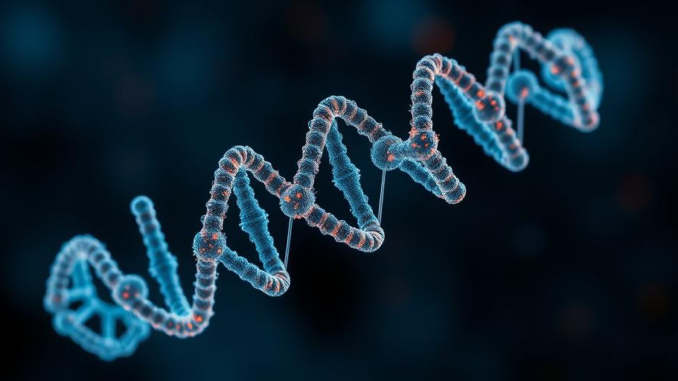
Summary
This article discusses a groundbreaking study revealing how a mother’s X chromosome can influence cognitive health in aging female mice. Researchers found that mice with only an active maternal X chromosome experienced faster cognitive decline and accelerated aging in the hippocampus, a crucial brain area for learning and memory. This discovery opens up new avenues for understanding and potentially treating age-related cognitive impairments.
** Main Story**
Maternal X Chromosome Influences Cognitive Aging
A recent study published in Nature has unveiled a surprising link between a mother’s X chromosome and cognitive health in aging female mice. Researchers at the University of California, San Francisco (UCSF) discovered that when brain cells in female mice rely solely on the X chromosome inherited from their mother, they age more rapidly, leading to faster cognitive decline.
X Chromosome Inactivation and Its Effects
Female mammals possess two X chromosomes, one from each parent. However, only one X chromosome is active in each cell. The other X chromosome undergoes a process called X inactivation, where its genetic activity is silenced. This inactivation typically occurs randomly, with some cells expressing the maternal X chromosome (Xm) and others expressing the paternal X chromosome (Xp), creating a mosaic pattern.
The UCSF researchers investigated the impact of X chromosome origin on brain aging by engineering two groups of female mice. One group expressed only maternal X chromosomes, while the other group expressed a mixture of maternal and paternal X chromosomes, mirroring the natural mosaicism seen in most females.
Accelerated Brain Aging in Maternal X Mice
The research team employed a combination of behavioral tests, gene expression analysis, and epigenetic techniques to assess the cognitive abilities and hippocampal aging of the mice. They found that the female mice expressing only the maternal X chromosome displayed poorer memory and learning abilities as they aged compared to the control group with a mix of maternal and paternal X chromosomes. The maternal X chromosome seemed to accelerate biological aging in the hippocampus, a brain area vital for learning and memory.
Silenced Genes and Cognitive Decline
Further investigation revealed that specific genes related to cognition were turned off, or silenced, on the maternal X chromosomes in the hippocampal neurons of the mice. This silencing effect was more pronounced in the maternal X group, potentially contributing to their faster cognitive decline. The researchers also observed signs of accelerated biological aging through changes in DNA methylation patterns in the hippocampus of the maternal X mice.
Implications for Human Health
While this study focused on mice, the findings raise intriguing questions about the potential implications for human cognitive health. It suggests that women who predominantly express their maternal X chromosome might be at higher risk for age-related cognitive decline and diseases like Alzheimer’s. However, more research is needed to confirm these findings in humans and explore the underlying mechanisms involved.
Future Research Directions
The UCSF team plans to continue their research on X chromosomes and the brain, focusing on identifying the specific genes and pathways involved in the observed cognitive decline. They believe this research could ultimately lead to the development of new strategies for slowing brain aging and improving cognitive health in both men and women. Moreover, the study also raises evolutionary questions, as the gene silencing observed on the maternal X chromosome might offer advantages during early life, such as enhanced brain development or immune regulation, while posing a trade-off later in life with accelerated aging.
New Advances in Geriatric Care
This research on the maternal X chromosome’s impact on brain aging aligns with broader advancements in geriatric care aimed at understanding and addressing the diverse factors contributing to age-related cognitive decline. Other notable innovations in geriatric care include:
- Wearable health devices: These devices monitor vital signs, track physical activity, and detect falls, providing real-time health data to caregivers and healthcare providers.
- Telemedicine: This technology allows older adults to consult with doctors remotely, improving access to care and reducing the need for travel.
- Medication management systems: Automated pill dispensers and reminder apps help seniors manage their medications effectively, reducing the risk of missed doses.
- Smart home technology: Voice-activated assistants, smart lighting, and security systems enhance safety and convenience for seniors at home.
- Remote monitoring systems: These systems track health metrics like blood pressure and heart rate, enabling continuous monitoring and early detection of potential issues.
- Virtual reality (VR) technology: VR provides therapeutic experiences for cognitive training, physical rehabilitation, and social interaction.
- Mobile health apps: These apps offer personalized health information, medication reminders, and access to healthcare resources.
- Assistive robotics: Robots can aid seniors with daily tasks, promoting independence and reducing the burden on caregivers.
- Artificial intelligence (AI): AI is used to analyze patient data, predict health trends, and personalize care plans.
These advancements, along with the insights from the UCSF study on maternal X chromosomes, pave the way for a new era of geriatric care focused on promoting healthy brain aging and improving the quality of life for older adults.


The finding that maternal X chromosome expression may accelerate cognitive decline in female mice opens fascinating avenues for understanding human aging. Exploring potential epigenetic interventions to mitigate this effect could be a promising research direction.
That’s a great point! Epigenetic interventions could indeed offer a targeted approach. It’s exciting to consider how we might influence X chromosome activity to promote healthier cognitive aging. This research direction could potentially lead to preventative strategies for age-related cognitive decline. Thanks for highlighting this important area!
Editor: MedTechNews.Uk
Thank you to our Sponsor Esdebe
So, if maternal X chromosomes could potentially predispose women to faster cognitive decline, does this mean we can blame our mothers for our future senior moments? Asking for a friend, obviously.